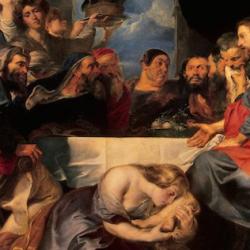Sermon notes for August 10:
A Forerunner Before the Lord, Luke 1:57-80
INTRODUCTION
John the Baptist’s motto was “He must increase, I must decrease” (John 3:30). Though Luke does not quote this saying, the early chapters of his gospel are written to illustrate exactly this principle. Luke tells about the greatness and miraculous conception of John (1:5-25), and then tells about the superior greatness and even more miraculous conception of Jesus (1:26-56). He tells about the birth, circumcision, and naming of John, which evokes song from a Jewish priest (1:57-80); then he tells us about the birth of Jesus, and angels fill heaven with song (2:1-14). John is the son of a priest who serves in the temple, but the Master of the temple is Jesus’ father (2:41-51).
TEXT
“Now Elizabeth’s full time came for her to be delivered, and she brought forth a son. When her neighbors and relatives heard how the Lord has shown great mercy to her, they rejoiced with her” (Luke 1:57-80).
ZACHARIAS AND THE JEWS
For Luke, many of the small incidents of the gospel story are miniature summaries of the whole gospel story. The story of Zacharias is like this. Gabriel comes preaching the gospel to Zacharias (1:19), but he disbelieves and in effect asks for a sign. When he acknowledges the word of the angel by naming his son John, his tongue is loosed and he rejoices.
Zacharias’s story exemplifies the condition of Israel in a couple of ways. First, for centuries, Yahweh had been silent. There had been no prophet since shortly after the return from Babylonian exile. When Zacharias the mute priest begins to speak, it is a sign that Yahweh is saying another word, His final Word, to Israel. Second, Zacharias foreshadows the response of Jews in the gospel and Acts. Instead of being filled with joy and gladness at the glad tidings, many reject Jesus and are silenced in darkness (cf. 1 Samuel 2:9). Luke leaves hope for the Jews: When they confess that Yahweh has shown grace through John and Jesus, their mouths will be opened again in praise.
MINISTRY OF A FORERUNNER
John’s ministry is described in several ways in Luke 1. First, he will “go before” the Lord in His coming (1:17, 76-79). Throughout Scripture, God prepares His people before He comes in judgment and deliverance. Moses came to deliver Israel, they rejected him, and he had to flee; later, he returned and Yahweh delivered His people (Acts 7:20-44). Samuel prepared the way for King David, Elijah for the ministry of Elisha, Daniel and Ezekiel for the restoration from exile. For John, the key preparation is the call to repentance and the promise of forgiveness (1:77; 3:3). A king is coming to deliver His people; instead of mustering an army, John gathers penitents.
Second, John is like Elijah (1:17). Like Elijah, he is persecuted by a vacillating king and a hateful queen. Like Elijah, he prepares the way for another prophet, Elisha-Jesus. Like Elijah, he turns many away from idolatry. He even shared Elijah’s taste in clothing (Matthew 3:4; 2 Kings 1:8).
FATHERS AND CHILDREN
Finally, alluding to Malachi 4, Gabriel says that John will “turn the hearts of the fathers back to the children” (1:17). Compared to the great historical events that Luke deals with, restoring affection between fathers and children may seem minor, but it’s central to John’s ministry. Breaches between generations had plagued Israel throughout her history: Abraham was followed by Isaac, who preferred Esau to Jacob. Joshua’s generation was followed by the time of the judges. Samuel had unfaithful sons. David was followed by Solomon, who fell away, and Solomon was followed by Rehoboam, whose foolishness split the kingdom. Hezekiah was followed by Manasseh. In the last book of the Old Testament, Yahweh charges that His children, Israel, do not honor Him as their Father (Malachi 1:6).
Without continuity between fathers and sons, the achievements of each generation are undone in the next, and the kingdom cannot not grow. On the other hand, if the sons do nothing but repeat what the fathers have done, the result is stagnation. We avoid this dilemma by striving to the life found in the ultimate family, the Trinity. There is a dynamic between Father and Son. They are not simply identical. And yet there is no breach or competition. The Father promotes the glory of His Son, the Son glorifies His Father, and they are bound together in the mutual love of the Spirit. Restoration of fathers to children, like everything else Luke talks about, is the work of the Spirit.
For Further Study
1. Elizabeth calls Mary “the mother of my lord” (Luke 1:43; Greek for “lord” is kurios ). What is Elizabeth declaring about Jesus? Look at 1:6, 9, 11, 15, 16, 32, 38 (all use the same Greek word).
2. The angel’s greeting to Mary is translated as “Rejoice” in the NKJV (1:28), and there is an allusion to the exhortation to rejoice in Zephaniah 3:14. Read Zephaniah 3:14-20 and think about how this passage applies to Mary (hint: “in your midst” in Zephaniah 3:15, 17 could be translated as “in you”). Look at the whole prophecy of Zephaniah; how does it prophesy about Jesus’ birth?
3. The word “overshadow” Luke uses 1:35 is the same word used in Exodus 40:35. Why does Luke use this word? What light does this shed on John the Baptist’s in utero dance? Compare Luke 1:44 and 2 Samuel 6:16.










